[学前教育有关英语的论文]学前教育方面的小论文
幼儿学前英语教育论文
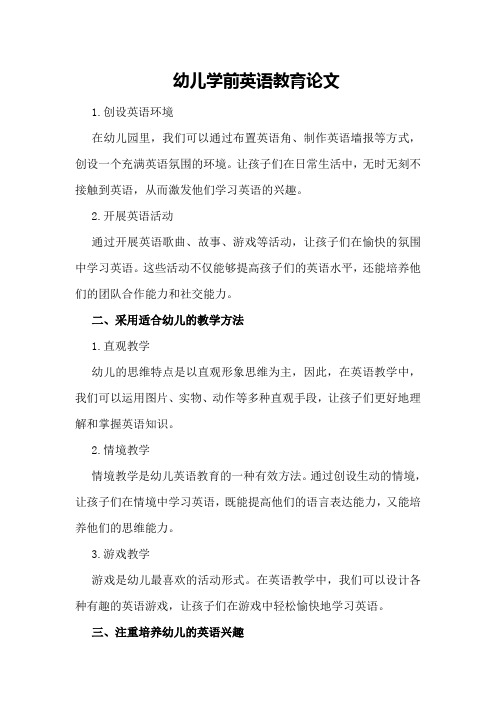
幼儿学前英语教育论文1.创设英语环境在幼儿园里,我们可以通过布置英语角、制作英语墙报等方式,创设一个充满英语氛围的环境。
让孩子们在日常生活中,无时无刻不接触到英语,从而激发他们学习英语的兴趣。
2.开展英语活动通过开展英语歌曲、故事、游戏等活动,让孩子们在愉快的氛围中学习英语。
这些活动不仅能够提高孩子们的英语水平,还能培养他们的团队合作能力和社交能力。
二、采用适合幼儿的教学方法1.直观教学幼儿的思维特点是以直观形象思维为主,因此,在英语教学中,我们可以运用图片、实物、动作等多种直观手段,让孩子们更好地理解和掌握英语知识。
2.情境教学情境教学是幼儿英语教育的一种有效方法。
通过创设生动的情境,让孩子们在情境中学习英语,既能提高他们的语言表达能力,又能培养他们的思维能力。
3.游戏教学游戏是幼儿最喜欢的活动形式。
在英语教学中,我们可以设计各种有趣的英语游戏,让孩子们在游戏中轻松愉快地学习英语。
三、注重培养幼儿的英语兴趣1.激发好奇心好奇心是幼儿学习的内在动力。
在英语教学中,我们要善于激发孩子们的好奇心,让他们对英语产生浓厚的兴趣。
2.设置小目标在英语学习过程中,我们要根据孩子们的实际情况,为他们设置合适的小目标。
当孩子们达成目标时,要及时给予表扬和鼓励,让他们感受到成功的喜悦。
3.注重情感交流四、家庭与幼儿园的互动1.加强家长沟通2.开展亲子活动通过开展亲子英语活动,让家长参与到孩子的英语学习中来,既能增进亲子关系,又能提高孩子的英语水平。
幼儿学前英语教育是一项重要的工作。
我们要根据幼儿的年龄特点和认知规律,采用适合他们的教学方法,激发他们的英语兴趣,为他们的未来发展打下坚实的基础。
幼儿学前英语教育论文在幼儿园的小天地里,英语教育的春风早已悄然吹拂。
作为一名经验丰富的幼儿教育工作者,我发现,孩子们对于英语的兴趣和敏感度超乎我们的想象。
他们如同小小的海绵,渴望吸收各种知识,尤其是语言的学习。
下面我就来聊聊我对幼儿学前英语教育的一些心得体会。
和学前教育有关的英语作文
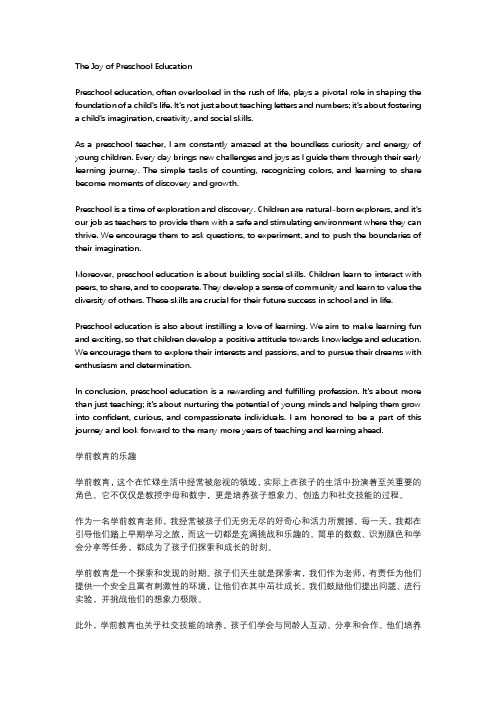
The Joy of Preschool EducationPreschool education, often overlooked in the rush of life, plays a pivotal role in shaping the foundation of a child's life. It's not just about teaching letters and numbers; it's about fostering a child's imagination, creativity, and social skills.As a preschool teacher, I am constantly amazed at the boundless curiosity and energy of young children. Every day brings new challenges and joys as I guide them through their early learning journey. The simple tasks of counting, recognizing colors, and learning to share become moments of discovery and growth.Preschool is a time of exploration and discovery. Children are natural-born explorers, and it's our job as teachers to provide them with a safe and stimulating environment where they can thrive. We encourage them to ask questions, to experiment, and to push the boundaries of their imagination.Moreover, preschool education is about building social skills. Children learn to interact with peers, to share, and to cooperate. They develop a sense of community and learn to value the diversity of others. These skills are crucial for their future success in school and in life.Preschool education is also about instilling a love of learning. We aim to make learning fun and exciting, so that children develop a positive attitude towards knowledge and education. We encourage them to explore their interests and passions, and to pursue their dreams with enthusiasm and determination.In conclusion, preschool education is a rewarding and fulfilling profession. It's about more than just teaching; it's about nurturing the potential of young minds and helping them grow into confident, curious, and compassionate individuals. I am honored to be a part of this journey and look forward to the many more years of teaching and learning ahead.学前教育的乐趣学前教育,这个在忙碌生活中经常被忽视的领域,实际上在孩子的生活中扮演着至关重要的角色。
重视学前教育的英文作文
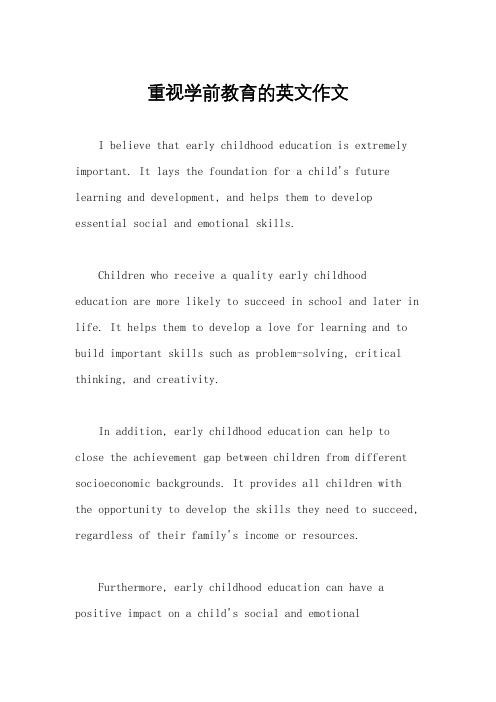
重视学前教育的英文作文I believe that early childhood education is extremely important. It lays the foundation for a child's future learning and development, and helps them to develop essential social and emotional skills.Children who receive a quality early childhood education are more likely to succeed in school and later in life. It helps them to develop a love for learning and to build important skills such as problem-solving, critical thinking, and creativity.In addition, early childhood education can help to close the achievement gap between children from different socioeconomic backgrounds. It provides all children with the opportunity to develop the skills they need to succeed, regardless of their family's income or resources.Furthermore, early childhood education can have a positive impact on a child's social and emotionaldevelopment. It helps them to build strong relationships with their peers, develop empathy and compassion, and learn how to regulate their emotions.Overall, I believe that investing in early childhood education is one of the best ways to ensure a bright future for our children and our society as a whole. It is acrucial step in building a strong foundation for lifelong learning and success.。
学前教育专业幼儿英语教学研究论文
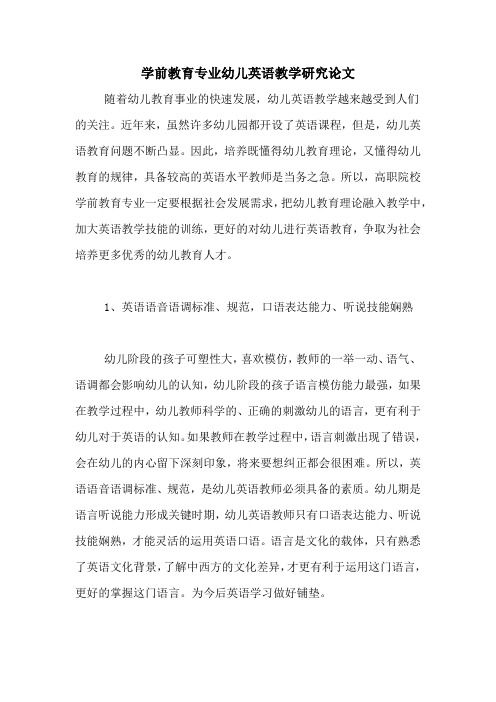
学前教育专业幼儿英语教学研究论文随着幼儿教育事业的快速发展,幼儿英语教学越来越受到人们的关注。
近年来,虽然许多幼儿园都开设了英语课程,但是,幼儿英语教育问题不断凸显。
因此,培养既懂得幼儿教育理论,又懂得幼儿教育的规律,具备较高的英语水平教师是当务之急。
所以,高职院校学前教育专业一定要根据社会发展需求,把幼儿教育理论融入教学中,加大英语教学技能的训练,更好的对幼儿进行英语教育,争取为社会培养更多优秀的幼儿教育人才。
1、英语语音语调标准、规范,口语表达能力、听说技能娴熟幼儿阶段的孩子可塑性大,喜欢模仿,教师的一举一动、语气、语调都会影响幼儿的认知,幼儿阶段的孩子语言模仿能力最强,如果在教学过程中,幼儿教师科学的、正确的刺激幼儿的语言,更有利于幼儿对于英语的认知。
如果教师在教学过程中,语言刺激出现了错误,会在幼儿的内心留下深刻印象,将来要想纠正都会很困难。
所以,英语语音语调标准、规范,是幼儿英语教师必须具备的素质。
幼儿期是语言听说能力形成关键时期,幼儿英语教师只有口语表达能力、听说技能娴熟,才能灵活的运用英语口语。
语言是文化的载体,只有熟悉了英语文化背景,了解中西方的文化差异,才更有利于运用这门语言,更好的掌握这门语言。
为今后英语学习做好铺垫。
2、学前教育基本技能娴熟,学前专业理论知识过硬作为幼儿第二语言的启蒙教育,幼儿英语教育不仅要培养幼儿良好的英语学习习惯,还要在教学过程中,激发幼儿学习英语的兴趣,促进幼儿英语语言的敏感性,为幼儿将来学好英语奠定基础。
因此,幼儿英语教师不仅要英语语音语调标准、规范,口语表达能力、听说技能娴熟,还要学前教育基本技能娴熟,学前专业理论知识过硬。
幼儿的身心发展规律特殊,所以,在教学过程中,教师首先必须了解幼儿的身心发展特点,同时,掌握学前教育的理论知识。
尤其是学前心理学、学前教育学等理论知识必须娴熟。
只有掌握了专业理论知识,了解幼儿的身心发展特点,才能根据幼儿认知规律、身心发展规律制订相应的,同时,根据学生的年龄特征、兴趣爱好,选择适合孩子的教育策略,激发幼儿的英语学习兴趣,提高幼儿英语的教育质量。
关于学前教育专业的英语作文

The Importance of Preschool Education: Shaping the Future GenerationPreschool education, often overlooked in the race for academic excellence, plays a pivotal role in the cognitive, emotional, and social development of young children. It is during this critical phase that children's brains are like sponges, absorbing information and experiences that will shape their future. Preschool education not only prepares children academically but also equips them with the necessary skills and attributes for life-long learning and success.The academic benefits of preschool education are numerous. Children who attend preschool are more likely to have a higher IQ, better language skills, and a stronger foundation in math and science. Preschool provides a structured environment where children learn through play, which stimulates their imagination and creativity. Thistype of learning is not only fun but also effective in engaging children's minds and fostering a love for learning. Moreover, preschool education is essential for social and emotional development. Preschool is a microcosm ofsociety, where children learn to interact with peers, share, negotiate, and resolve conflicts. They also learn toregulate their emotions and develop a sense of empathy and compassion. These skills are crucial for children's success in school and later in life.Additionally, preschool education instills values and ethics that are vital for character development. Children learn to respect others, follow rules, and takeresponsibility for their actions. They also learn toproblem-solve and make informed decisions. These values and ethics form the foundation of a child's moral compass, guiding them through life's challenges and decisions.However, the benefits of preschool education extend beyond the classroom. Preschool teachers serve as role models, providing children with positive examples of behavior and attitude. They encourage children to explore, take risks, and persevere in the face of challenges. This encouragement fosters a growth mindset, where childrenlearn that failure is not permanent and that with hard work and perseverance, they can achieve anything.In conclusion, preschool education is not just about teaching children letters and numbers; it's about shaping the future generation. It prepares children academically, socially, emotionally, and morally, giving them the tools and skills they need to succeed in school and in life. As we invest in preschool education, we invest in the future of our society, ensuring that the next generation is well-prepared, well-rounded, and ready to take on the world. **学前教育的重要性:塑造未来的一代**在追求学术卓越的竞赛中,学前教育往往被忽视,但它在儿童的认知、情感和社会发展中起着至关重要的作用。
关于学前教育专业的英语作文

关于学前教育专业的英语作文**The Importance of Preschool Education and Its Impact on Children's Development**Preschool education, an integral part of a child's early development, plays a pivotal role in shaping their cognitive, emotional, and social skills. This crucial phase of education, often overlooked, holds immense potential for laying a solid foundation for future learning and success. The cognitive development of children during preschool years is remarkable. This is a time when their brains are actively developing neural connections, making them sponge-like in absorbing new information. Through variousactivities such as storytelling, singing, and hands-on experiments, preschool education stimulates children's curiosity and imagination, encouraging them to explore and understand the world around them.Moreover, preschool education fosters emotional and social skills in children. In a preschool setting, children learn to interact with peers, share, and cooperate, which are essential skills for later life. They also learn toexpress their feelings and understand the emotions of others, fostering empathy and compassion.The impact of preschool education is not limited to the immediate present but extends to the long-term future of children. Children who receive quality preschool education are more likely to excel in academic settings later on, demonstrating better literacy and numeracy skills. They also tend to have higher self-esteem and confidence, which are critical for success in school and beyond.However, it is important to note that not all preschool education is created equal. The quality of preschool education varies widely, and it is crucial to choose a program that meets the individual needs and interests of each child. Factors such as teacher qualifications, curriculum content, and class size can significantly influence the effectiveness of preschool education.In conclusion, preschool education is a vital component of a child's early development, shaping their cognitive, emotional, and social skills. Its impact extends far beyond the preschool years, influencing children's academic and personal success throughout their lives. It is, therefore,essential for parents and educators to prioritize preschool education and ensure that children receive quality early learning experiences.**学前教育的重要性及其对儿童发展的影响**学前教育作为儿童早期发展的一个重要组成部分,在塑造儿童认知、情感和社交技能方面起着关键作用。
学前教育双语教育论文(通用6篇)

学前教育双语教育论文学前教育双语教育论文(通用6篇)学前教育是就业率排名最高的专业之一,几乎是供不应求,很多幼儿园都需要提前下“定单”。
大家不妨来看看小编推送的学前教育双语教育论文,希望给大家带来帮助!学前教育双语教育论文篇1新疆是少数民族聚居区,长期世居于这片沃土上的有13个民族,为推动区域文化的积极发展,教育要先行,高校教育所肩负的责任就更加重要了。
双语学前教育教学是近几年新疆文化战略部署中的重要举措,是推动新疆少数民族文化的积极措施,舞蹈作为学前教育专业中的专业必修课程,在实际教学过程中他是不同于普通学前教育专业的舞蹈课程,它的内容设置、教学思路、教学方法都是有待探讨的。
一、双语学前教育的舞蹈教学现状1、概念界定双语学前教育:本文双语学前教育主要是针对少数民族地区的学生在学习的过程中掌握汉语或汉族学生在学习的过程中掌握少数民族语言。
学前教育专业舞蹈教学:学前教育专业的舞蹈教学是在教学内容的设计与安排上与专业班舞蹈教学内容有所不同,她主要是让学生掌握各民族舞蹈动态元素之后,并会结合儿童动态元素进行儿童舞蹈的表演与编排,对元素的化简及熟练运用相结合,更注重学生舞蹈综合能力的培养。
2、双语学前教育专业的舞蹈教学现状分析学前教育专业的舞蹈教学在经过课程改革后,舞蹈教学课时由原来四年的教学课时量减为两年完成,教学时数减少后教学内容随之也发生较大的变化,很多内容因此删去,如汉族民间舞蹈包括:陕北秧歌、东北秧歌、云南花灯、安徽花鼓灯、胶州秧歌五大类,在实际的教学过程中只能有选择地选择1至2种进行教学。
在实践教学的过程中,为了完成教学计划,对学生进行由理论到实践的环节明显减少了。
教师在教学过程中要让学生学会一个民族的舞蹈动态元素的过程中,要快速地简单讲解该动态元素的基本特征及该动态元素在学习的过程中应如何更准确的掌握,其重点是在动作的教授过程中,而对该民族的地域、文化、民俗部分的讲解,该环节在教学过程中往往被教师们所忽略。
学前教育毕业论文范文(4篇)
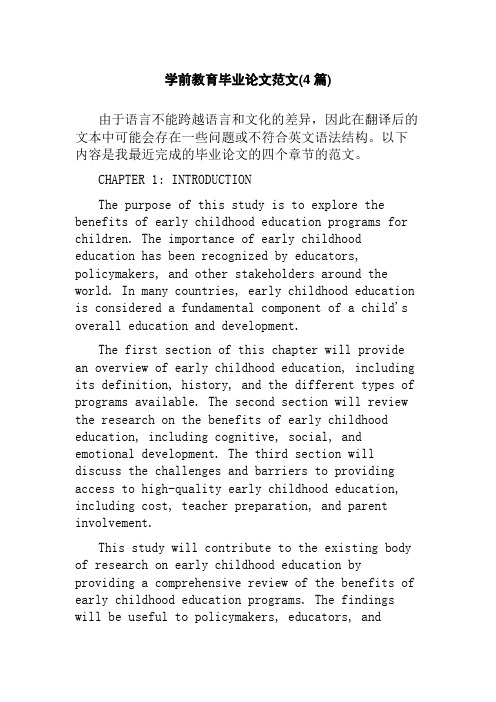
学前教育毕业论文范文(4篇)由于语言不能跨越语言和文化的差异,因此在翻译后的文本中可能会存在一些问题或不符合英文语法结构。
以下内容是我最近完成的毕业论文的四个章节的范文。
CHAPTER 1: INTRODUCTIONThe purpose of this study is to explore the benefits of early childhood education programs for children. The importance of early childhood education has been recognized by educators, policymakers, and other stakeholders around the world. In many countries, early childhood education is considered a fundamental component of a child's overall education and development.The first section of this chapter will provide an overview of early childhood education, including its definition, history, and the different types of programs available. The second section will review the research on the benefits of early childhood education, including cognitive, social, and emotional development. The third section will discuss the challenges and barriers to providing access to high-quality early childhood education, including cost, teacher preparation, and parent involvement.This study will contribute to the existing body of research on early childhood education by providing a comprehensive review of the benefits of early childhood education programs. The findings will be useful to policymakers, educators, andparents who are interested in supporting early childhood education.CHAPTER 2: LITERATURE REVIEWThis chapter will provide a review of the research on the benefits of early childhood education programs. It will begin with an overview of the research on the cognitive benefits of early childhood education and then move on to the research on the social and emotional benefits.The cognitive benefits of early childhood education are well-documented. Research has shown that children who attend high-quality early childhood education programs perform better ontests of cognitive ability, language development, and academic achievement than children who do not attend such programs. These benefits areparticularly pronounced for children from low-income families and those who are at risk of academic failure.The social and emotional benefits of early childhood education are equally important. Research has shown that children who attend high-quality early childhood education programs are more likely to develop positive social skills, such as cooperation, sharing, and empathy. They are also less likely to exhibit behavior problems, such as aggression and impulsivity.Despite the overwhelming evidence of the benefits of early childhood education, access to high-quality programs remains a challenge. This is particularly true for children from low-incomefamilies and those who live in rural or underserved areas. To address this issue, policymakers and educators must work to increase funding for early childhood education programs and to provide professional development opportunities for early childhood educators.CHAPTER 3: METHODOLOGYThe purpose of this study is to explore the benefits of early childhood education programs for children. The research question for this study is: What are the benefits of early childhood education programs for children's cognitive, social, and emotional development? The research design for this study will be a systematic literature review.The inclusion criteria for this study will be peer-reviewed articles published in English between 2000 and 2019 that focus on the benefits of early childhood education programs. The exclusioncriteria will be articles that focus on programsfor older children or adolescents, and articlesthat do not focus on the benefits of early childhood education programs.The search strategy for this study will include searching electronic databases such as ERIC, Education Research Complete, and PsycINFO. The search terms will include \。
学前教育专业幼儿英语教学研究论文

学前教育专业幼儿英语教学研究论文在全球化的大背景下,英语作为国际通用语言,其重要性日益凸显。
学前教育阶段是孩子们语言发展的黄金时期,因此,幼儿英语教学显得尤为重要。
本文将从学前教育专业幼儿英语教学的角度,探讨如何在教学中激发幼儿学习英语的兴趣,提高他们的英语水平。
一、引言随着我国经济的快速发展,家长们对子女的教育越来越重视,尤其是英语教育。
学前教育阶段是孩子们语言敏感期,抓住这一时期进行英语教学,有助于孩子们更好地掌握英语。
然而,在实际教学中,如何有效地进行幼儿英语教学,提高孩子们的英语水平,是学前教育专业教师面临的一大挑战。
二、学前教育专业幼儿英语教学现状1.教学方法单一当前,学前教育专业幼儿英语教学普遍存在教学方法单一的问题。
很多教师仍然采用传统的“填鸭式”教学,注重语法知识的传授,而忽视孩子们的兴趣和实际需求。
2.教学资源不足在教学资源方面,学前教育专业幼儿英语教学也面临一定的困境。
很多幼儿园缺乏适合幼儿的英语教材和教具,导致教师难以开展生动有趣的教学活动。
3.教师素质参差不齐学前教育专业幼儿英语教师的素质也是影响教学效果的关键因素。
目前,一些幼儿园的教师素质参差不齐,部分教师自身英语水平有限,难以胜任教学任务。
三、学前教育专业幼儿英语教学策略1.创设生动有趣的教学情境针对教学方法单一的问题,教师可以尝试创设生动有趣的教学情境,让孩子们在轻松愉快的氛围中学习英语。
例如,通过角色扮演、歌曲、故事等形式,引导孩子们主动参与教学活动。
2.丰富教学资源为了提高幼儿英语教学效果,幼儿园应积极采购适合幼儿的英语教材和教具,为教师提供丰富的教学资源。
同时,教师也应善于利用网络资源,为孩子们提供更多学习英语的机会。
3.提高教师素质学前教育专业幼儿英语教师应不断提高自身素质,提高英语水平。
幼儿园可以定期组织教师培训,邀请专业英语教师进行指导。
教师还应注重自身的学习和成长,不断更新教学观念和方法。
4.注重幼儿个体差异每个孩子的学习能力和兴趣点都不尽相同,教师应关注幼儿个体差异,因材施教。
介绍学前教育专业的英语作文
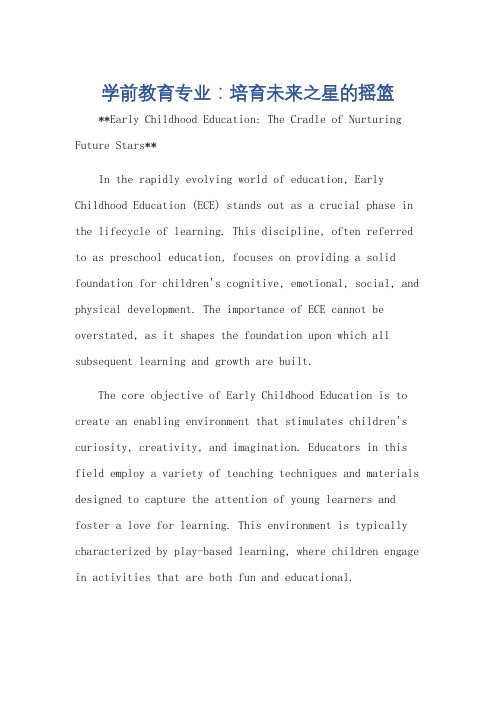
学前教育专业:培育未来之星的摇篮**Early Childhood Education: The Cradle of Nurturing Future Stars**In the rapidly evolving world of education, Early Childhood Education (ECE) stands out as a crucial phase in the lifecycle of learning. This discipline, often referred to as preschool education, focuses on providing a solid foundation for children's cognitive, emotional, social, and physical development. The importance of ECE cannot be overstated, as it shapes the foundation upon which all subsequent learning and growth are built.The core objective of Early Childhood Education is to create an enabling environment that stimulates children's curiosity, creativity, and imagination. Educators in this field employ a variety of teaching techniques and materials designed to capture the attention of young learners and foster a love for learning. This environment is typically characterized by play-based learning, where children engage in activities that are both fun and educational.The role of Early Childhood Educators is pivotal. They are not just teachers, but mentors and guides who nurturethe growth of children in a safe and supportive environment. These educators must possess a deep understanding of child development, as well as the ability to connect withchildren emotionally and intellectually. They must also be adept at creating an inclusive learning environment whereall children, regardless of their backgrounds, are able to thrive.The benefits of Early Childhood Education are numerous. Children who receive a strong preschool education are more likely to excel academically, demonstrate better social skills, and possess a stronger sense of self-confidence. Furthermore, the foundation laid in Early Childhood Education sets the tone for lifelong learning, encouraging children to explore new interests and pursue their passions. The field of Early Childhood Education is constantly evolving, keeping pace with advances in educational theory and practice. Educators in this field must stay updatedwith the latest research and developments, ensuring that their teaching methods remain effective and engaging. Associety increasingly recognizes the value of Early Childhood Education, there is an urgent need for well-trained and qualified educators to meet the demands of this growing field.In conclusion, Early Childhood Education is a vital component of the education system, responsible for laying the foundation for children's future learning and growth. It requires a dedicated and passionate workforce of educators who are committed to nurturing the potential of every child. As we move forward, it is imperative that we continue to invest in Early Childhood Education, ensuring that every child has access to a quality preschool education that will enable them to reach their full potential.**学前教育专业:培育未来之星的摇篮**学前教育,作为教育领域中迅速发展的一个分支,对于儿童的认知、情感、社会和身体发展起着至关重要的作用。
学前教育的英语作文

Preschool education is a critical phase in a childs development,laying the foundation for their future learning and growth.Here are some key aspects to consider when discussing preschool education in an English essay:1.Importance of Early Learning:Begin by emphasizing the significance of early childhood education.It is during these years that children develop cognitive,social,and emotional skills that are crucial for their overall development.2.Holistic Development:Discuss how preschool education focuses on the holistic development of a child.This includes physical,emotional,social,and intellectual growth.3.PlayBased Learning:Highlight the role of play in preschool education.Play is a natural way for children to learn about the world around them,develop problemsolving skills, and build social relationships.nguage Development:Language skills are a fundamental part of preschool education. Discuss how children learn to communicate effectively,understand others,and express themselves through speech and writing.5.Cultural Awareness:Preschool education should also introduce children to different cultures and traditions,fostering respect and understanding for diversity.6.Parental Involvement:The role of parents in preschool education is vital.Parents should be encouraged to participate in their childs learning process,reinforcing what is taught at school.7.Teacher Qualifications:The qualifications and training of preschool teachers are essential.Teachers should be equipped with the necessary skills to cater to the developmental needs of young children.8.Curriculum Design:Discuss the importance of a welldesigned curriculum that is ageappropriate,engaging,and encourages exploration and creativity.9.Health and Nutrition:The role of health and nutrition in preschool education should not be overlooked.Healthy eating habits and physical activity are integral to a childs wellbeing.10.Transition to Formal Education:Preschool education should prepare children for the transition to formal schooling.Discuss how it helps children adjust to a structured learning environment and develop a positive attitude towards learning.11.Challenges and Solutions:Address any challenges faced in preschool education,such as accessibility,affordability,or quality of education,and propose potential solutions.12.Conclusion:Conclude by summarizing the importance of preschool education and its impact on a childs future academic success and personal development. Remember to use a variety of sentence structures and vocabulary to make your essay engaging and to demonstrate your proficiency in English.Additionally,providing examples or anecdotes can help illustrate your points more effectively.。
学前教育专业 英语作文

Preschool education is a crucial phase in the development of a childs cognitive, social,and emotional skills.The role of preschool teachers is not only to impart basic knowledge but also to foster a love for learning and a sense of curiosity in young minds. Here are some key points to consider when discussing preschool education in an English essay:1.Importance of Early Childhood Education:Highlight the significance of preschool education in laying the foundation for a childs future learning.Discuss how it helps in the development of motor skills,language abilities,and social interactions.2.Curriculum Design:Explain the importance of a wellrounded curriculum that includes playbased learning,storytelling,music,and art.Discuss how these activities stimulate creativity and imagination in children.3.Teacher Qualifications:Emphasize the need for preschool teachers to have specialized training in early childhood development.They should be equipped with the knowledge to understand the unique needs of young learners and adapt their teaching methods accordingly.4.Inclusive Learning Environment:Discuss the importance of creating an inclusive environment where all children,regardless of their abilities or backgrounds,feel welcomed and valued.This includes providing resources and support for children with special needs.5.Parental Involvement:Stress the importance of involving parents in the preschool education process.Parents play a vital role in reinforcing what children learn at school and supporting their development at home.6.Assessment Methods:Explain that assessment in preschool should be informal and observational rather than formal testing.Teachers should track childrens progress in various developmental areas to provide appropriate support and enrichment.7.Challenges in Preschool Education:Address the challenges faced by preschool educators,such as limited resources,large class sizes,and the need for continuous professional development.8.Technology Integration:Discuss how technology can be used effectively in preschool education to enhance learning experiences.This could include educational apps, interactive whiteboards,and digital storytelling.9.Cultural Sensitivity:Emphasize the need for preschool education to be culturally sensitive and inclusive,teaching children about diversity and respect for all cultures from an early age.10.Future of Preschool Education:Conclude by reflecting on the future of preschool education,including potential developments in pedagogical approaches,the role of technology,and the importance of ongoing research to improve educational outcomes for young children.Remember to use a variety of sentence structures and vocabulary to make your essay engaging and to avoid repetition.Additionally,ensure that your essay is wellorganized with a clear introduction,body paragraphs that explore each point in depth,and a conclusion that summarizes the main ideas.。
幼儿学前英语教育论文
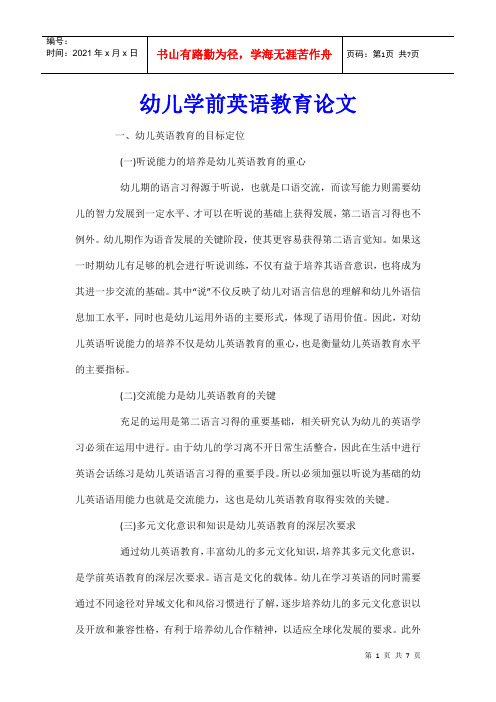
幼儿学前英语教育论文一、幼儿英语教育的目标定位(一)听说能力的培养是幼儿英语教育的重心幼儿期的语言习得源于听说,也就是口语交流,而读写能力则需要幼儿的智力发展到一定水平、才可以在听说的基础上获得发展,第二语言习得也不例外。
幼儿期作为语音发展的关键阶段,使其更容易获得第二语言觉知。
如果这一时期幼儿有足够的机会进行听说训练,不仅有益于培养其语音意识,也将成为其进一步交流的基础。
其中“说”不仪反映了幼儿对语言信息的理解和幼儿外语信息加工水平,同时也是幼儿运用外语的主要形式,体现了语用价值。
因此,对幼儿英语听说能力的培养不仅是幼儿英语教育的重心,也是衡量幼儿英语教育水平的主要指标。
(二)交流能力是幼儿英语教育的关键充足的运用是第二语言习得的重要基础,相关研究认为幼儿的英语学习必须在运用中进行。
由于幼儿的学习离不开日常生活整合,因此在生活中进行英语会话练习是幼儿英语语言习得的重要手段。
所以必须加强以听说为基础的幼儿英语语用能力也就是交流能力,这也是幼儿英语教育取得实效的关键。
(三)多元文化意识和知识是幼儿英语教育的深层次要求通过幼儿英语教育,丰富幼儿的多元文化知识,培养其多元文化意识,是学前英语教育的深层次要求。
语言是文化的载体。
幼儿在学习英语的同时需要通过不同途径对异域文化和风俗习惯进行了解,逐步培养幼儿的多元文化意识以及开放和兼容性格,有利于培养幼儿合作精神,以适应全球化发展的要求。
此外多元文化教育也是对外语教育本身提出的更高要求,使其脱离英语作为单纯的语言工具的狭隘范围,从而使学前儿童的英语学习具有更为广泛的价值。
二、幼儿外语教育对教师的基本素质的要求教师在幼儿外语教育中起着至关重要的作用,面对内心世界丰富多彩的儿童时,如何调动他们学习英语的积极性和主动参与意识,比知识的传授更重要,因此英语教师必须具备包括专业知识在内的综合素质。
(一)心理素质首先,学前英语教师必须具备良好的观察能力和敏捷的思维能力,在教学过程中能够对幼儿的表情和以及行为上的变化进行及时准确的捕捉,并依据这些变化对教学活动的方式、方法进行相应的调整,进而吸引幼儿的注意,并将其思维时刻引向教学活动的中心。
学前儿童英语教育的论文
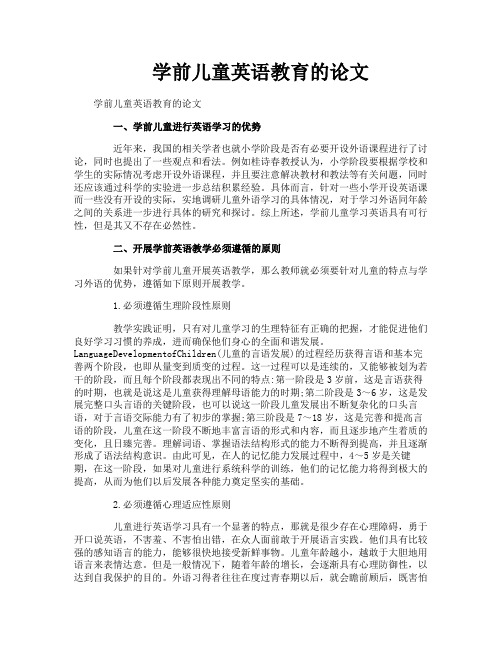
学前儿童英语教育的论文学前儿童英语教育的论文一、学前儿童进行英语学习的优势近年来,我国的相关学者也就小学阶段是否有必要开设外语课程进行了讨论,同时也提出了一些观点和看法。
例如桂诗春教授认为,小学阶段要根据学校和学生的实际情况考虑开设外语课程,并且要注意解决教材和教法等有关问题,同时还应该通过科学的实验进一步总结积累经验。
具体而言,针对一些小学开设英语课而一些没有开设的实际,实地调研儿童外语学习的具体情况,对于学习外语同年龄之间的关系进一步进行具体的研究和探讨。
综上所述,学前儿童学习英语具有可行性,但是其又不存在必然性。
二、开展学前英语教学必须遵循的原则如果针对学前儿童开展英语教学,那么教师就必须要针对儿童的特点与学习外语的优势,遵循如下原则开展教学。
1.必须遵循生理阶段性原则教学实践证明,只有对儿童学习的生理特征有正确的把握,才能促进他们良好学习习惯的养成,进而确保他们身心的全面和谐发展。
LanguageDevelopmentofChildren(儿童的言语发展)的过程经历获得言语和基本完善两个阶段,也即从量变到质变的过程。
这一过程可以是连续的,又能够被划为若干的阶段,而且每个阶段都表现出不同的特点:第一阶段是3岁前,这是言语获得的时期,也就是说这是儿童获得理解母语能力的时期;第二阶段是3~6岁,这是发展完整口头言语的关键阶段,也可以说这一阶段儿童发展出不断复杂化的口头言语,对于言语交际能力有了初步的掌握;第三阶段是7~18岁,这是完善和提高言语的阶段,儿童在这一阶段不断地丰富言语的形式和内容,而且逐步地产生着质的变化,且日臻完善。
理解词语、掌握语法结构形式的能力不断得到提高,并且逐渐形成了语法结构意识。
由此可见,在人的记忆能力发展过程中,4~5岁是关键期,在这一阶段,如果对儿童进行系统科学的训练,他们的记忆能力将得到极大的提高,从而为他们以后发展各种能力奠定坚实的基础。
2.必须遵循心理适应性原则儿童进行英语学习具有一个显著的特点,那就是很少存在心理障碍,勇于开口说英语,不害羞、不害怕出错,在众人面前敢于开展语言实践。
和学前教育有关的英语作文
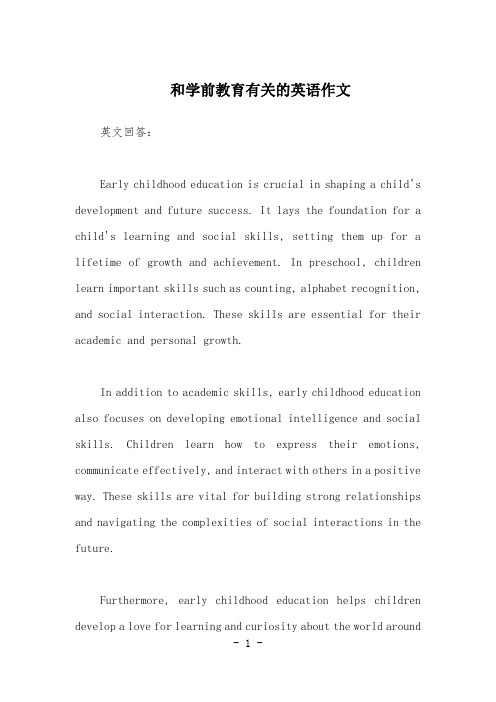
和学前教育有关的英语作文英文回答:Early childhood education is crucial in shaping a child's development and future success. It lays the foundation for a child's learning and social skills, setting them up for a lifetime of growth and achievement. In preschool, children learn important skills such as counting, alphabet recognition, and social interaction. These skills are essential for their academic and personal growth.In addition to academic skills, early childhood education also focuses on developing emotional intelligence and social skills. Children learn how to express their emotions, communicate effectively, and interact with others in a positive way. These skills are vital for building strong relationships and navigating the complexities of social interactions in the future.Furthermore, early childhood education helps children develop a love for learning and curiosity about the world aroundthem. By exposing children to different subjects and activities at a young age, educators can ignite a passion for learning that will stay with them throughout their lives. This curiosity and love for learning are essential for fostering creativity, critical thinking, and problem-solving skills.In conclusion, early childhood education plays a crucial role in shaping a child's development and future success. By providing a solid foundation of academic, social, and emotional skills, educators can help children reach their full potential and thrive in all areas of their lives.中文回答:学前教育对于塑造孩子的发展和未来成功至关重要。
学前教育人文英语3作文
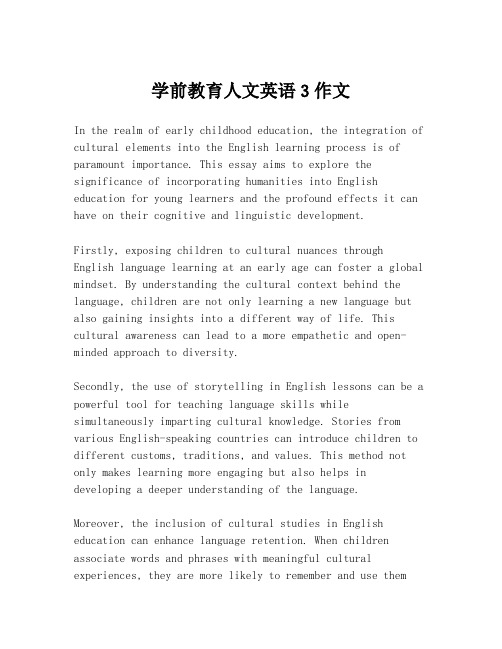
学前教育人文英语3作文In the realm of early childhood education, the integration of cultural elements into the English learning process is of paramount importance. This essay aims to explore the significance of incorporating humanities into English education for young learners and the profound effects it can have on their cognitive and linguistic development.Firstly, exposing children to cultural nuances through English language learning at an early age can foster a global mindset. By understanding the cultural context behind the language, children are not only learning a new language but also gaining insights into a different way of life. This cultural awareness can lead to a more empathetic and open-minded approach to diversity.Secondly, the use of storytelling in English lessons can be a powerful tool for teaching language skills while simultaneously imparting cultural knowledge. Stories from various English-speaking countries can introduce children to different customs, traditions, and values. This method not only makes learning more engaging but also helps in developing a deeper understanding of the language.Moreover, the inclusion of cultural studies in English education can enhance language retention. When children associate words and phrases with meaningful cultural experiences, they are more likely to remember and use themeffectively. This is particularly true for idiomatic expressions and colloquial language, which are often deeply rooted in the culture of the English-speaking countries.In addition, engaging young learners in cultural activities such as singing songs, celebrating festivals, and participating in role-play scenarios can make English learning more interactive and enjoyable. These activities not only reinforce language skills but also provide a platformfor children to express their creativity and understanding of the cultural content they are learning.Lastly, the early introduction of cultural English learning can lay the foundation for lifelong learning and appreciation of the English language and its associated cultures. It can spark an interest in foreign cultures and motivate children to continue exploring and learning throughout their educational journey.In conclusion, the integration of humanities in early childhood English education is crucial for developing well-rounded individuals who are not only linguistically competent but also culturally sensitive and aware. It is through this holistic approach to language learning that children cantruly appreciate the richness and diversity that the English language has to offer.。
学前教育的英语作文
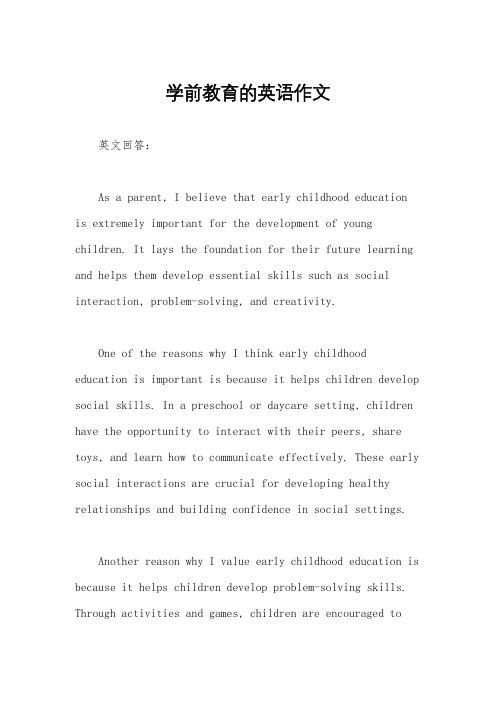
学前教育的英语作文英文回答:As a parent, I believe that early childhood educationis extremely important for the development of young children. It lays the foundation for their future learning and helps them develop essential skills such as social interaction, problem-solving, and creativity.One of the reasons why I think early childhood education is important is because it helps children develop social skills. In a preschool or daycare setting, children have the opportunity to interact with their peers, share toys, and learn how to communicate effectively. These early social interactions are crucial for developing healthy relationships and building confidence in social settings.Another reason why I value early childhood education is because it helps children develop problem-solving skills. Through activities and games, children are encouraged tothink critically, make decisions, and find solutions to challenges. These experiences help them develop a sense of independence and resilience, which are essential for their future success.Furthermore, early childhood education fosterscreativity and imagination. In a nurturing environment, children are encouraged to explore their interests, express themselves through art and play, and think outside the box. This helps them develop a love for learning and a curiosity about the world around them.In addition to these reasons, I also believe that early childhood education provides a solid academic foundationfor children. By introducing basic concepts such as numbers, letters, and shapes in a fun and interactive way, children are better prepared for formal schooling and have a head start in their academic journey.Overall, I believe that early childhood education is crucial for the holistic development of children. It not only prepares them for academic success, but also equipsthem with essential life skills that will benefit them inthe long run.中文回答:作为一名家长,我相信学前教育对于幼儿的发展至关重要。
学前教育对儿童发展的重要性英语作文
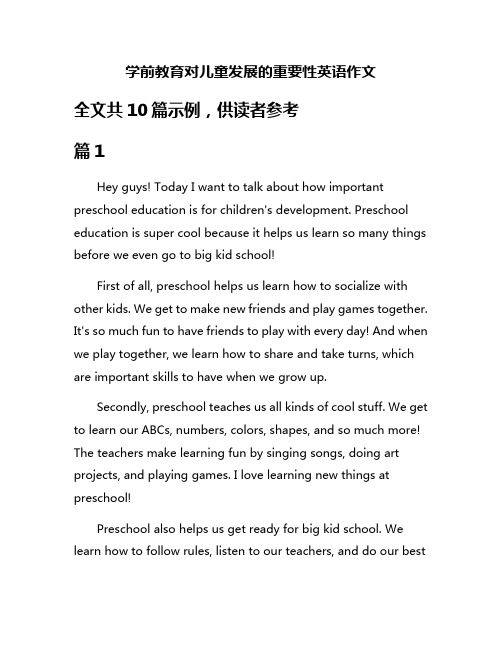
学前教育对儿童发展的重要性英语作文全文共10篇示例,供读者参考篇1Hey guys! Today I want to talk about how important preschool education is for children's development. Preschool education is super cool because it helps us learn so many things before we even go to big kid school!First of all, preschool helps us learn how to socialize with other kids. We get to make new friends and play games together. It's so much fun to have friends to play with every day! And when we play together, we learn how to share and take turns, which are important skills to have when we grow up.Secondly, preschool teaches us all kinds of cool stuff. We get to learn our ABCs, numbers, colors, shapes, and so much more! The teachers make learning fun by singing songs, doing art projects, and playing games. I love learning new things at preschool!Preschool also helps us get ready for big kid school. We learn how to follow rules, listen to our teachers, and do our bestwork. These are all skills that will help us succeed when we go to kindergarten and beyond.But most importantly, preschool is a place where we can be ourselves and have fun while we learn. The teachers are so nice and caring, and they always make sure we feel safe and happy. I love going to preschool every day because I know I will have a great time and learn something new.So, in conclusion, preschool education is super important for children's development. It helps us learn how to socialize, teaches us cool stuff, gets us ready for big kid school, and allows us to have fun while we learn. I'm so grateful for my preschool experience and I know it's setting me up for success in the future. Thank you, preschool!篇2The Importance of Early Childhood EducationHey guys, do you know how important early childhood education is for us kids? Let me tell you all about it!First of all, early childhood education helps us develop important skills that we will use for the rest of our lives. It teaches us how to communicate with others, solve problems, and thinkcritically. These skills are super important for when we grow up and go to school or start working.Secondly, early childhood education helps us build a strong foundation for our future learning. By learning things like numbers, letters, and shapes at a young age, we are better prepared to succeed in school later on. Plus, it's a lot easier to learn new things when we are young and our brains are like sponges!Another reason why early childhood education is so important is that it helps us develop socially and emotionally. We learn how to make friends, share with others, and manage our emotions. These skills are crucial for forming healthy relationships and being happy and successful in life.Lastly, early childhood education sets us up for success in the future. Studies have shown that kids who participate in high-quality early childhood programs are more likely to graduate from high school, go to college, and have successful careers. So, by getting a good start now, we are setting ourselves up for a bright future!In conclusion, early childhood education is super important for us kids. It helps us develop important skills, build a strong foundation for learning, develop socially and emotionally, andset us up for success in the future. So let's make sure we take advantage of every opportunity to learn and grow while we're young. Our future selves will thank us for it!篇3Title: The Importance of Early Childhood EducationHey guys, do you know why school is so important? Well, let me tell you! Early childhood education, which is like going to kindergarten or preschool, is super important for us kids. It helps us grow and learn so many new things!First of all, early childhood education helps us develop social skills. When we go to school, we get to meet new friends and learn how to interact with others. We learn how to share, take turns, and work together. These skills are super important for when we grow up and need to work with others.Secondly, early childhood education helps us develop cognitive skills. This means we get to learn new things like letters, numbers, shapes, and colors. We also get to practice our problem-solving skills by doing puzzles and games. All of this learning helps our brains grow and become smarter!Next, early childhood education helps us develop emotional skills. We learn how to manage our feelings and express ourselves in a healthy way. We also learn how to empathize with others and be kind and caring. These skills are so important for building strong relationships with others.Lastly, early childhood education sets us up for success in the future. When we start learning at a young age, we build a strong foundation for our education. This helps us do well in school later on and even go to college or get a good job. So, going to preschool or kindergarten is like laying the groundwork for our future success!In conclusion, early childhood education is super important for us kids. It helps us develop social, cognitive, emotional skills, and sets us up for success in the future. So, let's keep going to school and learning new things every day!篇4Learning is so important for little kids, and that's why preschool education is really crucial for our development. It helps us learn so many things and prepare us for big school!First of all, preschool teaches us all about numbers and letters. We get to practice counting, learn our ABCs, and evenstart reading simple words. This is super important for when we go to real school because we'll already know some of the basics.Preschool also helps us learn how to socialize with other kids. We get to make new friends, play together, and share toys. This is really important because it teaches us how to get along with others and work together as a team.Another thing that preschool does is help us develop our fine motor skills. We get to do lots of fun activities like coloring, cutting, and drawing. These activities help us learn how to use our hands and fingers in a precise way.Most importantly, preschool lets us explore and discover new things. We get to learn about the world around us, try new things, and ask lots of questions. This helps us become curious and eager to learn more.In conclusion, preschool education is super important for our development as kids. It teaches us important skills, helps us socialize, and gets us ready for big school. So let's have fun and learn a lot in preschool!篇5Do you know how important preschool education is for children's development? Let me tell you all about it!First of all, preschool education helps children to develop their social skills. In preschool, children learn how to interact with others, take turns, share toys, and work together in groups. These social skills are essential for forming friendships and getting along with others.Secondly, preschool education helps children to develop their cognitive skills. In preschool, children are introduced to basic concepts like numbers, colors, shapes, and letters. They also learn problem-solving skills and critical thinking skills through games and activities. These cognitive skills are important for academic success later on.Furthermore, preschool education helps children to develop their emotional skills. In preschool, children learn how to identify and express their emotions in a healthy way. They also learn how to regulate their emotions and cope with stress. These emotional skills are essential for mental health and well-being.In addition, preschool education helps children to develop their physical skills. In preschool, children have plenty of opportunities for active play and movement. They develop their gross motor skills through running, jumping, and climbing, aswell as their fine motor skills through drawing, cutting, and coloring. These physical skills are important for overall health and coordination.Overall, preschool education provides a strong foundation for children's development in all areas - social, cognitive, emotional, and physical. So, if you have the chance to attend preschool, make sure to take full advantage of it and have fun while learning and growing!篇6Hey guys!Today I want to talk about how important preschool education is for children's development. Preschool education is like a super cool adventure that helps us learn so many things and get ready for big school. Here are some reasons why preschool education is super duper important:Firstly, preschool helps us learn how to socialize with other kids. We get to make new friends, play games together, and learn how to share our toys. It's so much fun!Secondly, preschool teaches us important skills like counting, letters, colors, and shapes. We get to do fun activities and play games that help us learn new things. It's like magic!Thirdly, preschool helps us develop our creativity and imagination. We get to draw, paint, sing, dance, and make cool crafts. It's so awesome to see what we can create!Lastly, preschool helps us become more independent and confident. We learn how to do things on our own, like putting on our shoes, washing our hands, and cleaning up our toys. We feel so proud of ourselves!In conclusion, preschool education is super important for children's development. It helps us learn, grow, and become the best version of ourselves. So let's all give preschool a big thumbs up and get ready for some amazing adventures!Thanks for listening, guys! Let's keep learning and growing together. Bye-bye!篇7The Importance of Early Childhood EducationHey guys, do you know how important early childhood education is for us kids? It's super duper important! Let me tell you all about it.First of all, early childhood education helps us develop our brains. When we're little, our brains are like sponges, ready to soak up all kinds of knowledge. By going to preschool or daycare, we can learn new things, like ABCs, numbers, colors, and shapes. This helps us get ready for kindergarten and beyond.Secondly, early childhood education teaches us social skills. When we're around other kids our age, we learn how to share, take turns, and make friends. We also learn how to communicate and express ourselves. These are all important skills that will help us when we grow up.Another great thing about early childhood education is that it helps us become more independent. We learn how to do things on our own, like putting on our shoes, zipping up our jackets, and using the potty. This gives us a sense of accomplishment and boosts our self-esteem.Lastly, early childhood education sets a strong foundation for our future education. By starting early, we can develop a love for learning and build good study habits. This will make it easier for us to succeed in school later on.So, as you can see, early childhood education is super important for us kids. It helps us grow, learn, and thrive. Let's make sure we take advantage of all the opportunities available to us and make the most of our early years.篇8Title: The Importance of Early Childhood EducationHey guys! Do you know how important preschool education is for kids? Let me tell you all about it!First of all, preschool education helps us to develop social skills. We learn how to interact with our classmates, share toys, take turns, and make new friends. This is super important because it helps us to build relationships and work well with others in the future.Secondly, preschool education helps us to develop cognitive skills. We learn how to think critically, solve problems, and make decisions. We also learn early math and literacy skills which kickstart our learning journey. This is so cool because it helps us to be smart and ready for school!Furthermore, preschool education helps us to develop emotional skills. We learn how to express our feelings, manageour emotions, and develop empathy for others. This is awesome because it helps us to be kind, caring, and understanding individuals.In addition, preschool education encourages creativity and imagination. We get to explore, experiment, and create through art, music, and play. This is super fun because it helps us to think outside the box and express ourselves in unique ways.Overall, preschool education is super important for our development. It prepares us for school, helps us to make friends, builds our skills, and nurtures our creativity. So, let's enjoy every moment of preschool and grow into amazing individuals!That's all for today, guys! Stay curious, keep learning, and have fun in preschool! Bye-bye!篇9As a primary school student, I want to talk about the importance of early childhood education in helping children develop. Early childhood education is super duper important because it helps kids learn and grow in the bestest way possible.First of all, early childhood education helps us kids learn basic things like numbers, letters, colors, and shapes. It's likebuilding a strong foundation for our future learning. When we learn these things early on, it makes it easier for us to understand more difficult stuff when we get older. So, it's like starting off on the right foot.Secondly, early childhood education helps us kids develop important social skills. We learn how to make friends, share toys, and work together with others. These skills are super duper important because they help us get along with other people and be successful in life. Plus, it's more fun to play with friends than to play alone!Also, early childhood education helps us kids become more creative and imaginative. We get to do art projects, play pretend, and use our imaginations in lots of fun ways. This helps us think outside the box and come up with cool ideas. Who knows, maybe one day we'll invent something awesome or write a best-selling book!In conclusion, early childhood education is super duper important for us kids because it helps us learn, develop social skills, and become more creative. So, let's all give a big cheer for early childhood education! Hip hip hooray!篇10Why is preschool education important for children's development? Well, let me tell you all about it!First of all, preschool education helps us learn so many new things! We get to play with toys, sing songs, and listen to stories. This helps us develop our imagination, creativity, and language skills. We also get to learn numbers, letters, and colors, which are important for when we go to big school.Secondly, preschool teaches us how to socialize with other kids. We learn how to share, take turns, and work together. This is super important because it helps us make friends and get along with others. We also learn how to follow rules and listen to our teachers, which prepares us for when we go to school.Another reason preschool is important is because it helps us build our confidence and independence. We get to do things on our own, like painting a picture or building a tower with blocks. This shows us that we can do things by ourselves and that we are capable of learning new skills.Furthermore, preschool education helps us develop our fine and gross motor skills. We get to play outside, run around, and climb on the playground equipment. This helps us strengthen our muscles and improve our coordination. We also get to do activities that use our hands, like drawing, cutting, and pickingup small objects. This helps us improve our hand-eye coordination and dexterity.In conclusion, preschool education is super important for children's development. It helps us learn new things, socialize with others, build confidence and independence, and develop our motor skills. So, if you're a kid like me, make sure you go to preschool and have lots of fun learning and playing!。
- 1、下载文档前请自行甄别文档内容的完整性,平台不提供额外的编辑、内容补充、找答案等附加服务。
- 2、"仅部分预览"的文档,不可在线预览部分如存在完整性等问题,可反馈申请退款(可完整预览的文档不适用该条件!)。
- 3、如文档侵犯您的权益,请联系客服反馈,我们会尽快为您处理(人工客服工作时间:9:00-18:30)。
[学前教育有关英语的论文]学前教育方面的小论文
学前教育有关英语的论文篇一
《学前儿童英语教育方法的研究》
摘要:随着社会生活信息化和经济全球化,英语作为一门国际语言受到全世界人民的重视,也被很多国家作为官方语言使用。
尤其是幼儿英语教育,在当今已成为一个热门话题。
影响幼儿英语学习的三大教育因素是教材、教学方法、教师素质。
教师应当及时更新教育理念,结合现代发展需求和幼儿的身心发展特点,改进教学方法,帮助幼儿学习英语。
文章以游戏兴趣法为例,对幼儿英语教育进行研究以利于幼儿更好地学习英语。
关键词:游戏教学法;幼儿英语教育;教学方法
幼儿英语教育是时代的需求,是社会发展的需要,也是幼儿园发展的需要。
现在英语教学正在逐步走向生动化和生活化,因此,只有活跃课堂气氛,调动学生兴趣才能使英语教学更有实效。
在幼儿英语教育中,教师正确的教学方法是关键。
爱因斯坦说过“兴趣是最好的老师”,教育心理学中也讲过,只有孩子感兴趣的东西才会主动思考。
为了满足幼儿的求知欲,教师要以一种最简洁的方法使幼儿获得必要的知识。
爱玩是孩子的天性,幼儿最感兴趣的就是游戏,在游戏的同时汲取知识,这是一种更容易让幼儿接受的方法,所以游戏兴趣法是幼儿英语教育中重要的方法之一。
在幼儿英语教育中,教师在游戏中不断探究新的形式和方法,是提高幼儿英语水平和培养幼儿英语学习兴趣的重要手段。
学前儿童英语教育是指根据学前儿童身心发展特点和语言学习规律,通过创设适宜的环境对学前儿童进行的英语启蒙教育。
学前儿童的英语启
蒙不同于小学英语教育,它是对学前儿童进行英语方面的早期启蒙,主要
目的是培养他们对英语语音语感的敏感,激发他们对英语学习的兴趣。
一、英语学习方法的创新种类
(一)昂立“0”式英语
昂立“0”式英语是以“英语学习零起点,课堂学习零距离,学生进
步零距离”为原则的教学理念和方法。
在教学上倡导全英文。
这一教学在
方法上强调一对一语言交流,让孩子成为学习英语的主角。
(二)汇点TPR模式
(三)卓越双语言教学法
卓越双语言教学法是指在课堂中,中外教共同教学,由专业中国教师
负责课堂英语知识总结、辅导疑难,由外教负责英语口语及英语课堂教学。
这种方法既创造了良好的英语环境,又能让学生更深刻地理解所学知识。
通过对以上几种具有创新性的英语学习方法的总结,结合园所的实际
情况,在运用游戏兴趣法时可将其进行创新综合,根据幼儿英语教育的启
蒙性,在适宜的难度基础上,创设语言环境,进行英汉双用。
国外的英语
教学理论界特别强调要把激发学生的学习兴趣放在重要位置,要创造轻松
愉快的学习气氛,尽量把枯燥的语言形式转变为学生乐于接受的、生动有
趣的游戏形式。
二、如何使游戏兴趣法得到正确运用
(一)加强幼儿英语教师的培训
当前,幼儿园教师在组织英语教育活动时面临许多困难。
为解决这个
问题,教育研究和管理部门应对幼儿英语教师的上岗资格认证严格把关。
一方面加强教师英语专业知识的日常学习和继续深造,不断更新英语知识;另一方面为教师提供具有针对性的幼儿园英语教学培训。
此外,还应加强
幼儿英语教师在实践教育活动中的灵活性,使教师不仅有较高的专业理论
知识,而且在教学中能将实际与理论相结合,更好地将理论运用于教学。
(二)通过游戏创设良好的语言环境
要给幼儿创造良好的语言环境,必须丰富孩子的生活。
因为生活是语
言的源泉,只有丰富的生活,才能为语言提供良好的环境。
幼儿园要注意
增长幼儿的知识经验,扩展视野,促进思维发展,才能培养孩子良好的语
言表达能力。
在课堂上,通过教师设计的游戏,让幼儿多看,拓宽观察角度;让幼儿多听,培养孩子注意倾听的习惯;让幼儿多说,使他们有话讲、
愿意讲。
在课下,要利用饭后、室外运动等时间有目的地同孩子进行英语
交流,不论说错说对,都要鼓励孩子。
这样幼儿园就形成了一个良好的语
言环境,让幼儿自然而然地习惯于用英语进行日常交流。
(三)游戏设计的目的性及适宜性
游戏教学必须以教学内容为中心,在设计游戏的时候要充分把握课程
的重点、难点,围绕教学目的合理安排设计游戏。
这样才能达到教学目的。
游戏活动设计要符合不同年龄阶段儿童各方面的水平差异。
评判游戏
是否具有高质量、教育性的标准是学生与老师是否进行互动,在互动的过
程中把适当的知识传授给幼儿。
游戏给予幼儿认识世界和发展幼儿符号能
力的机会。
在幼儿英语教学中的设计也要符合这一主线。
学前儿童英语游戏兴趣教学法是根据幼儿身心发展的年龄特征,遵循
幼儿语言学习的基本规律和原则,创建系统的,有丰富内涵的英语学习体系。
通过游戏这一桥梁,激发幼儿兴趣,使幼儿积极主动探究,让幼儿初
步获得英语语感、英语思维及英语意识。
通过游戏兴趣法的教学,让幼儿在轻松、快乐、自由的氛围中学习英语,既有利于幼儿语言交往能力的培养,又为幼儿进入读写阶段的学习打下良好的基础。
